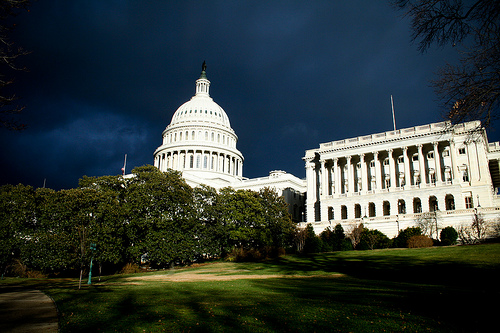
The Irish bon vivant Oscar Wilde naughtily observed that the reason the politics of academic life were so sharp was because the stakes were so small. In the United States today, politics are growing even sharper and nastier because the stakes are so huge.
The United States is very much at a dangerous inflection point. And the trajectory isn’t good.
How the United States arrived at this juncture is less important than what, if anything, can be done to reverse this decline. Two outcomes are sadly predictable. Future U.S. expectations will be dramatically curtailed and the collective standard of living will decline possibly precipitously over the next decades.
The overarching and unanswerable question is whether a political system of checks and balances designed by the best minds of the 18th century can tolerate or survive the rigors and pressures of the 21st century.
To work, checks and balances need compromise. Unfortunately, both political parties have allowed compromise to become overwhelmed by partisan ideology and have turned U.S. politics into a zero sum game in which the objective is to destroy the opposition at virtually any cost.
The United States has faced prior political crises, the Civil War being the worst. Between world wars, the United States was largely isolationist. Pearl Harbor forced the Americans into action and 40 years of Cold War provided some constraints to the centrifugal political forces that have become so divisive.
But Vietnam, Watergate and the last 20 years of past presidents who weren’t ready nor experienced enough for the job (along with two disastrous wars) have contributed to seemingly unbridgeable ideological divides crippling the United States’ capacity to govern.
Further, when the minority leader of the Senate could claim that his No. 1 goal was to make the president a one-termer rather than carry out his constitutional duties for which he was elected to office, it should come as no surprise that politics are in decline. And, of course, the other side responded.
The two most pressing issues facing the United States are economic and financial in nature manifested by the vast debt and deficits that are accumulating at a time when job creation is fragile; and an increasingly perilous international environment that has been characterized in this column as July 1914 in slow motion.
The rational solution to the first issue is to reform the tax code and entitlement programs to prevent the latter from becoming unsustainable. And here both parties profoundly divide.
The Obama administration and a majority of Democrats in Congress say that current actions to close the debt and deficits along with increased taxes on the top 1 percent of wage earners and the healthcare reforms passed last year are working.
Ironically, the president is following a Keynesian course recommended by Dick Cheney when, as vice president, he declared “deficits do not matter.”
Democrats’ assumption is that while annual deficits remain large, they are vital to stimulate growth at a time of economic weakness. Hence, reform of entitlements is less necessary and, more importantly, would adversely affect a large percentage of Democrats and constituents whose votes are vital to retaining the presidency and the Senate.
The Republican Party is in disarray lacking a leader and is subservient to the Tea Party with ideological positions against taxes and for large spending cuts. Given electoral gerrymandering, unless the 2020 census alters the political map, the House is almost certainly going to remain in Republican hands and the Senate under Democrats.
Contributing to this political descent, the White House has understandably shifted its powerful campaign apparatus to supporting the president’s political agenda. And given the Citizens vs. United Supreme Court decision that permits virtually unlimited campaign spending for political purposes, the Republicans will counterattack with their political action committees armed with hundreds of millions of dollars.
Hence, the United States is damned to a condition of permanent campaigning on all issues of political import. And talk radio, cable television and thousands of blogs and bloggers will weigh in to distort and demean the opposition adding further fuel to this political conflagration.
What can be done? The tragic answer is nothing.
The president retains a dominant position even though Republicans control the House. In essence, his inaugural address was a campaign speech and call to arms for Democrats to advance his agenda with or without bipartisan support. Meanwhile, the Republican Party resembles a rudderless ship adrift in heavy seas with neither charts nor workable compasses.
At some point, debt and deficits will matter. At some point, one of these international hotspots could explode. If those explosions are severe enough, perhaps some measure of bipartisanship will re-emerge. But don’t bet the farm on that happening.
U.S. politics are in a dangerous downwards spiral. And no one is at the controls.
Harlan Ullman is senior advisor at the Atlantic Council, and chairman of the Killowen Group that advises leaders of government and business. This article was syndicated by UPI.
Photo credit: Flickr user MiiiSH
Image: 3081383702_9234755c28.jpg
